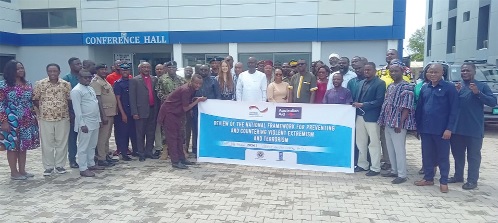
Meeting on countering violent extremism held in Bolgatanga
A three-day meeting to review the national framework for preventing and countering violent extremism and terrorism in Ghana has been held in Bolgatanga in the Upper East Region.
The meeting was attended by representatives of the various security agencies, district chief executives, civil society organisations, non-governmental organisations (NGOs) and other stakeholders.
It was organised by the Ministry of National Security with sponsorship from the United Nations Development Programme (UNDP) and the Australian High Commission in Ghana.
The forum sought to take stock of the implementation of the framework since its implementation in 2019, and also to educate the participants on the framework in its current form.
It was also intended for deliberations on aspects of the framework that might need review and offer an opportunity for key stakeholders to agree on recommendations for the review of the framework.
Ghana not pressured
Opening the stakeholders review meeting in Bolgatanga last Tuesday, the Deputy Director, National Counter Terrorism Fusion Centre, Ministry of National Security, Daniel Bonsu, said Ghana was not pressured as a result of the happenings in the Sahel region, but was rather concerned about ongoing activities across its borders.
He stated that the movement of internally displaced persons and terrorists into communities in the Upper East Region, coupled with using such areas for rest and as a logistical hub, was however a matter of great concern.

He added that a lot of things happening in the sub-region as the pattern and dynamics in relation to violent extremist activities was very worrying, which had resulted in the need for a review of the framework.
He urged the participants to demonstrate the highest level of professionalism during the deliberations to pave the way for the review of the framework to safeguard the peace in the country.
Border security
A representative from the Australian High Commission in Ghana, Candice Hooper, said since the release of the framework in 2019, the security situation on Ghana’s borders and beyond had deteriorated drastically.
She said in the first six months of this year, the lethality of recorded terrorist attacks once again increased, with extremists targeting civilians and military personnel alike across the Sahel and in some Gulf of Guinea states.
She said “it is within this context that the meeting is being held to examine the framework and consider its implementation as we seek peace and stability in Ghana and in the region.”
She mentioned that the outcome of the meeting would lead to a robust framework that better positions Ghana to confront the security challenges in the country, while fostering strong and inclusive communities who were at the forefront of the threat.
Global index
The Head of Governance and Growth, UNDP, Dr Edward Ampratwum, indicated that the recently published global terrorism index, 2024, painted a depressing picture with Burkina Faso named as the most impacted by terrorism with almost 2,000 deaths.
He mentioned that Burkina Faso’s situation represented a larger phenomenon as the epicentre of terrorism in today’s world, which had shifted from the Middle East and north Africa to sub-Saharan Africa.
According to UNDP’s journey to extremism report from 2023, worsening economic conditions, unemployment and poverty were major drivers towards violent extremism, stressing “this shows that creating a functional, democratic and peaceful society is dependent on inclusive distribution of economic dividends of democracy.”
While giving the assurance that the UNDP remained steadfast in its commitment to supporting Ghana in efforts to prevent and counter terrorism, he said the UNDP would provide technical expertise, capacity-building and partnerships to address underlying drivers of extremism.
“We will work closely with governments, CSOs and other stakeholders to promote inclusive development, foster dialogue and build resilience in communities across Ghana,” Dr Ampratwum stated.
Influx of immigrants
In a welcome address, the Upper East Regional Minister, Dr Hafiz Bin Salih, said due to the region’s proximity to the Sahel, most communities had since been inundated with immigrants from Burkina Faso and Togo.
As a result, he mentioned that there was the need to have in place mechanisms to build the resilience of communities to contain the situation and prevent any spill-over into Ghana.
Writer’s email:
